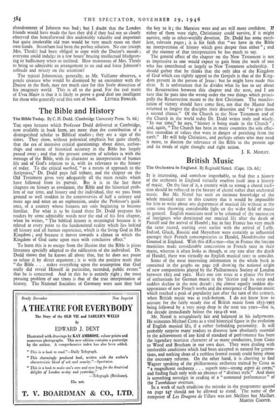The Bible and History
The Bible Today. By C. H. Dodd. (Cambridge University Press. 7s. 6d.) THE open lectures which Professor Dodd delivered at Cambridge, now available in book form, are more than the contribution of a distinguished scholar to Biblical studies ; they are a sign of the times. They show, without polemical emphasis but quite clearly, that the era of intensive critical questionings about dates, author- ships and extent of historical accuracy in the Bible has largely passed away ; and that the present concern of scholars is with the message of the Bible, with its character as interpretation of human life and of God's relation to it, with its relevance to the history of today. To the critical method, "as a means of approach to the Scriptures," Dr. Dodd pays full tribute, and the chapter on the Old Testament gives very adequately all the main results which have followed from its pursuit. But it is in the last three chapters on history as revelation, the Bible and the historical prob- lem of our time, and history and the individual, that we pass from ground so well trodden in the controversies of half a century and more ago and enter on an exploration, under the Professor's guid- ance, of a country whose features are only beginning to become familiar. For what is to be found there Dr. Dodd prepares his readers by some admirable words near the end of his first chapter, when he writes, "The biblical history is meaningful because it is related at every point to the fundamental reality which lies behind all history and all human experience, which is the living God in His Kingdom ; and because it moves towards a climax in which the Kingdom of God came upon men with conclusive effect."
To learn this is to escape from the illusion that the Bible is pious literature specially adapted to the edification of the individual. Dr. Dodd shows that he knows all about that, but he does not pause to refute it by direct argument ; it is with the positive truth that " the Bible . . . stakes everything upon the assumption that God really did reveal Himself in particular, recorded, public events " that he is concerned. And in this he is entirely right ; the most pressing problem of our times is that of the true interpretation of history. The National Socialists of Germany were sure they had
the key to it ; the Marxists were and are still more confident. If either of them were right, Christianity could survive, if it might survive, only as other-worldly devotion. Dr. Dodd has some excel- lent, relevant pages ; it is his faith that " we have in the Bible an interpretation of history which goes deeper than either " ; and of the manner of that interpretation he has much to say.
The general effect of the chapter on the New Testament is not as impressive as one would expect to gain from the work of one who has contributed so largely to New Testament scholarship. I should gather that he thinks that the only idea of the Kingdom of God which can rightly appeal to the Gospels is that of the King- dom present in the person of Jesus: but he might have made this clear. It is unfortunate that he divides what he has to say about the Resurrection between this chapter and the next, and I am sure that he puts into the wrong order the two things which princi- pally the Resurrection meant to the first Christians. The manifes- tation of victory should have come first, not that the Master had returned to forgive the disciples their desertion and " to give them a second chance." Of the Church in the New Testament and of the Church in the world today Dr. Dodd writes truly and wisely. " In our time," he says, " history is being made in the Church " ; and, again, " The Church has been in many countries the sole effec- tive custodian of values that were in danger of perishing from the earth." He will help Christians, and perhaps others who may need it more, to discern the relevance of the Bible to the present age and its needs of right thought and right action.
J. K. MOZLEY.


































 Previous page
Previous page